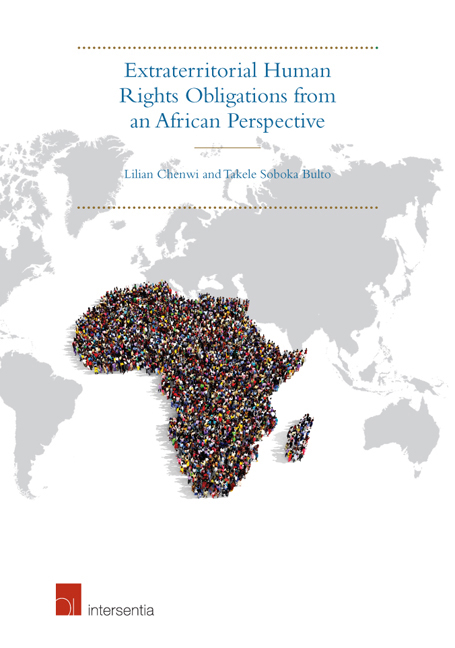Book contents
- Frontmatter
- Dedication
- Foreword
- Preface
- Contents
- List of Cases, Advisory Opinions and Other Decisions
- List of Treaties and Other Instruments
- About the Contributors
- Introduction
- Extraterritoriality in the African Regional Human Rights System from a Comparative Perspective
- Commercialisation of Educational Services and Extraterritorial Human Rights Obligations
- Extraterritorial Human Rights Obligations in the Context of Development Assistance to African States
- The Right to Food Beyond Borders: The Extraterritorial Reach of the Right to Food in Africa
- Extraterritorial Application of the Right to Water under the African System for the Protection of Human Rights
- Tortured Unity: United States–Africa Relations in Extraordinary Renditions and States’ Extraterritorial Obligations
- Indigenous Communities Displaced by Climate Change and Extraterritorial Application of States’ Obligations in Africa
- Land Grabbing, Extraterritorial Obligations and the Failure of Justice in Uganda: The Mubende Case
- Extraterritorial Obligations of Uganda for its Military's Failure to Respect and Protect Civilians in Areas of the Lord's Resistance Army Activity
- Bibliography
- Index
Land Grabbing, Extraterritorial Obligations and the Failure of Justice in Uganda: The Mubende Case
Published online by Cambridge University Press: 21 September 2018
- Frontmatter
- Dedication
- Foreword
- Preface
- Contents
- List of Cases, Advisory Opinions and Other Decisions
- List of Treaties and Other Instruments
- About the Contributors
- Introduction
- Extraterritoriality in the African Regional Human Rights System from a Comparative Perspective
- Commercialisation of Educational Services and Extraterritorial Human Rights Obligations
- Extraterritorial Human Rights Obligations in the Context of Development Assistance to African States
- The Right to Food Beyond Borders: The Extraterritorial Reach of the Right to Food in Africa
- Extraterritorial Application of the Right to Water under the African System for the Protection of Human Rights
- Tortured Unity: United States–Africa Relations in Extraordinary Renditions and States’ Extraterritorial Obligations
- Indigenous Communities Displaced by Climate Change and Extraterritorial Application of States’ Obligations in Africa
- Land Grabbing, Extraterritorial Obligations and the Failure of Justice in Uganda: The Mubende Case
- Extraterritorial Obligations of Uganda for its Military's Failure to Respect and Protect Civilians in Areas of the Lord's Resistance Army Activity
- Bibliography
- Index
Summary
INTRODUCTION
Uganda, like many African countries, has fallen prey to land grabbing, which has seen poor and vulnerable subsistence farmers lose their land and means of livelihood. All the cases of land grabbing in the country are at the instance of foreign corporations that have chosen Uganda's land either for the production of commodity crops, mining activities or to grow forests for carbon credits. Recently, although still seemingly isolated, land grabs for the purposes of infrastructure (especially road) development are beginning to emerge. The land grabs are mostly condoned by the government of Uganda, which in these cases lends its military and police force to hastily evict poor farmers without following due process of law. The companies that have benefited from the land grabs are from such countries as Germany, Norway, the Netherlands and China. The most puzzling aspect surrounding the incidents of land grabbing is that the government in many cases acts contrary to its own laws and fails to extend to poor farmers their legally guaranteed security of occupancy and property rights. One of the cases which clearly bring out this contradiction is the Mubende case. The case epitomises the many cases of land grabbing in Uganda and the blatant violation of the rights of poor and desperate subsistence farmers, tipping them further into poverty. The only reason this case has come to the fore is because of the attention that some international non-governmental organisations have focused on it.
This chapter seeks to analyse the context within which evictions such as those in the Mubende case are occurring in Uganda, fuelled mainly by the country's neo-liberal policies, which are aimed at attracting direct foreign investment. The chapter therefore looks at the political economics which have pressured the country to liberalise its economy and open up for such investment. The trend can be traced to the early years of the introduction of structural adjustment programmes (SAPs) at the instance of the World Bank and International Monetary Fund (IMF). Although there appears to be a move away from SAPs, their impact is still felt. Yet, subsequent development planning policies have continued to promote economic liberalisation, with much emphasis on attracting direct foreign investment.
- Type
- Chapter
- Information
- Publisher: IntersentiaPrint publication year: 2018



